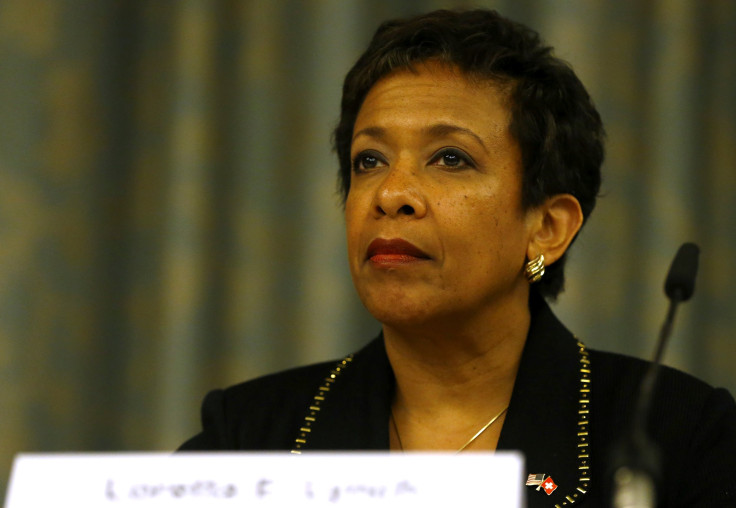San Bernardino Attack: AG Loretta Lynch Claims EU Privacy Policies Hurt Anti-Terror Efforts

In the wake of the Paris terror attacks and the San Bernardino shootings, U.S. Attorney General Loretta Lynch has criticized European governments for restrictions placed on intelligence agencies sharing counterterrorism information with their peers across the Atlantic and around the world.
Speaking in central London on Wednesday alongside U.K. Home Secretary Theresa May, Lynch said: "It is particularly disappointing that the European Court of Justice -- in a case based on inaccurate and outdated media reports -- recently struck down the Safe Harbor agreement."
The so-called safe harbor agreement, signed in 2000, allowed U.S. companies to easily send customer data from the European Union to servers based across the Atlantic. In October, the European Court of Justice deemed "Safe Harbor" invalid after a Facebook user cited concerns about the safety of his personal information in the wake of revelations by National Security Agency whistleblower Edward Snowden.
Laughable
Lynch -- who is best known in Europe for leading the investigation that led to the indictment of FIFA executives earlier this year and eventually the resignation of the soccer association's president, Sepp Blatter -- claims that media reports about the systems Snowden made public were now out of date and says during U.S. President Barack Obama's time in office, he "has created unprecedented transparency regarding the collection of intelligence data."
However, not everyone agrees with Lynch's assessment of the situation. “I think it’s wishful thinking by the U.S. Attorney General to characterize the judgment in Safe Harbor as based on ‘inaccurate and outdated media reports’," Mike Weston, CEO of data science consultancy Profusion, told International Business Times, adding: “Although the striking down of Safe Harbor is inconvenient to U.S. tech companies and unsettling for the global tech community, I think it is laughable to say that the judgment was based on faulty information."
Weston also highlights a perceived hypocrisy in Lynch's comments given the recent passing of the Cybersecurity Information Sharing Act (CISA) last month. "The Act further erodes what little data privacy protections EU citizens could expect in the U.S."
It Could Get Worse
Proposed legislation which is currently before the European Parliament and which could further restrict European data sharing also drew criticism from Lynch. "It is highly concerning to us that data privacy legislation advancing in the European Parliament might further restrict transatlantic information sharing," she said.
The legislation Lynch refers to is the General Data Protection Regulation (GDPR) that is currently in the final "trilogue" stages of discussion, where the European Commission, European Parliament and Council of the European Union come together to work out the final draft. The legislation aims to modernize data protection rules for the digital age by giving back more control of data to citizens. The change was first proposed almost four years ago in January 2012 and was given the backing of the European Parliament in March 2014. It is expected to be finalized in the first half of 2016.
Lynch said that the U.K. and U.S. have a special responsibility to tackle terrorism and claimed the U.S. government has passed laws to protect the privacy not only of U.S. nationals, but also European citizens. Part of that was a U.S.-led "24/7" cyber network which now links 70 countries and was critical in France's quick response to the Paris attacks last month. Lynch also claimed that U.S. intelligence has helped Interpol identify 4,000 foreign terrorist fighters, though she didn't say over what period of time.
© Copyright IBTimes 2024. All rights reserved.




















